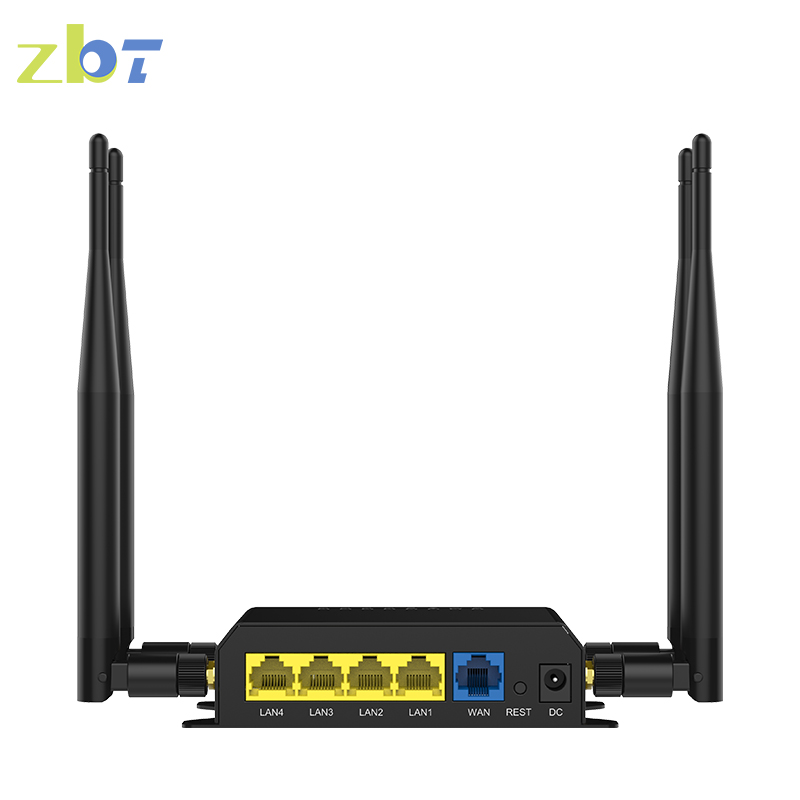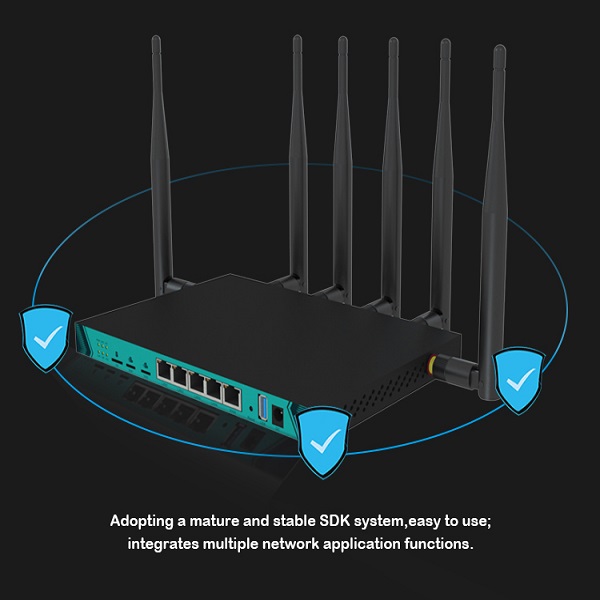Our expert, award-winning staff selects the products we cover and rigorously researches and tests our top picks. If you buy through our links, we may get a commission. How we test ISPs
Mobile carriers rave about what it can do for your phone. Is there a real opportunity for your home broadband connection, too? 4g Wifi

Are you tired of being tied to internet service providers with cumbersome contracts, low speeds, restrictive terms and rising fees? You're not alone. A 2023 customer survey tagged ISPs as the country's second-lowest-rated industry . Yes, even lower than airlines, social media, health insurance companies and the US Postal Service. Whoa! All too often, though, we feel we have hardly any options and fewer alternatives . Could 5G be the answer?
The technology powering the newest phones also wants to tackle our household broadband needs. A solid home internet connection is vital, whether working from home or decompressing with the latest video games. The earliest 5G home internet plans, available from names like Starry, Verizon and T-Mobile , offer respectable speeds at a straightforward price -- but availability is limited to select cities and regions. CNET has reviewed all of the major 5G services , and we've got the details on how they work, how fast it gets, what it costs and where it's available.
Simply put, 5G stands for the fifth generation. The fifth generation of what? The fifth generation of wireless data networks. You're probably most familiar with hearing 5G used to describe better mobile communications and speedier phones . You're not wrong: 5G networks, which use different radio frequencies than previous generations, aim to provide faster data speeds with much less lag or delay than we had with 4G.
My CNET colleague Eli Blumenthal does a great job of breaking down the basics of 5G . Millimeter-wave technology uses higher frequencies than previous generations, providing faster speeds and connections. But those higher, gigabit speeds come with a price -- the data doesn't travel the same distance as 4G and has more trouble with obstructions. To combat that, midband technology, which offers speeds averaging between 300 and 400 megabits per second, increases the coverage area provided by millimeter-wave. Finally, low-band 5G offers a range similar to 4G but speeds between 100 and 200Mbps.
Nope. One common mistake is to see the "5GHz" setting on your Wi-Fi router and assume you have access to 5G. Wi-Fi routers also use short-range radio frequencies -- typically either 2.4GHz or 5GHz -- to transmit your internet signal to connected devices within your home. So 5GHz is one of the band options for your home's Wi-Fi system, but it's not the same as 5G, a cellular technology that uses higher-frequency waves.
Cable, DSL and fiber internet plans require wires connecting your home to the provider's grid. Fixed wireless services, like 5G, connect your home to a provider's network over the air.
Most ISPs deliver internet service via phone lines or cables connecting your home to a more extensive network. That includes common internet connection types , like digital subscriber line , coaxial cable and fiber-optic internet . Those are all wired connections from your provider to your home.
5G home internet, on the other hand, is a fixed wireless internet service, which means that the connection between your provider and your home is not wired. With 5G, you will need an indoor or outdoor 5G receiver at your house to pick up the signal. It's similar to satellite internet , but instead of beaming in a signal from satellites orbiting in the night sky, it's relaying information from a much closer wireless hub. Even though you're using the same 5G network as your mobile phone, the gateway is specific to your location and cannot be used elsewhere.
5G is still being deployed across the country. Due to that, the number of providers currently offering any 5G home internet plan is relatively limited. For example, AT&T provides a 5G mobile service, but its fixed wireless solution does not currently utilize its 5G network. But we expect that to change soon -- AT&T recently announced its AT&T Internet Air will begin utilizing it shortly .
But right now, your main options for 5G home internet are Starry, T-Mobile and Verizon. All prices listed on this page reflect available discounts for setting up paperless billing. If you decide not to go with automatic monthly payments, your monthly bill will be higher. Now, let's explore what each offers.
Starry is a relatively new player on the ISP field. The company started in 2016 but does not lean into the 5G connection. It does not use 5G NR radio technology, which is a focus of mobile providers, but it does use millimeter-wave technology as a critical aspect of delivering fixed wireless home internet to customers. "We operate in 24GHz and 37GHz spectrum bands, and our network technology is the same across all our markets," a Starry spokesperson said.
The monthly price includes unlimited data, free equipment and installation, and no contracts. It's also the only 5G home internet provider listed here that features symmetrical or near-symmetrical download and upload speeds, similar to what you'd find with a fiber internet service.
Lastly, Starry also offers a "30-Day Happy Interneting Guarantee" with a full refund if you aren't satisfied with the service and cancel within the first 30 days.
It should be noted that Starry filed in February for a Chapter 11 restructuring, so it halted plans to expand to new cities. It will focus on its five existing markets: Boston, Denver, Los Angeles, New York and Washington, DC.
Read our Starry Internet review.
T-Mobile Home Internet features the lowest broadband speeds among our listed providers. That's because it wavers between 4G LTE and 5G. It's not exclusively 5G. T-Mobile "anticipates" that most customers will average between 72 and 245Mbps download speeds. When CNET tested T-Mobile's service in 2021, we hit a max of 132Mbps.
T-Mobile's service includes all setup fees and taxes. There is no annual contract or data cap. It includes a Price Lock guarantee that shields you from any price increases for as long as you remain a customer. It will also pay up to $750 in termination fees for switching providers. Among its current deals are six free months of SiriusXM, weekly perks through T-Mobile Tuesday and savings of $20 off the monthly price for eligible T-Mobile voice customers.
Read our T-Mobile Home Internet review.
Verizon's 5G internet service, which uses Ultra Wideband 5G technology, boasts max download speeds of up to 1 gigabit and average speeds of around 300Mbps. However, upload speeds are not symmetrical and will plateau at 50Mbps or less because Verizon does not exclusively use the millimeter-wave technology, but rather a mix of low-band, midband and millimeter-wave.
Verizon 5G Home Internet pricing is $50 a month for a two-year price guarantee or $70 a month to lock in the price for three years, plus some extra perks. Either way, it's an all-in price that includes equipment, setup fees and taxes, and like all other Verizon plans, it requires no contracts or data caps.
Verizon offers many promos and deals to sweeten the pot for potential customers. First, it provides an early termination fee credit offer to give qualifying customers a bill credit of up to $500 if they switch from their current ISP and are charged an ETF. Second, 5G Home Plus customers can choose a HomePod (valued at $300) or a $200 Verizon gift card. Lastly, customers with qualifying Verizon mobile plans will get a discount on the monthly cost of either plan, bringing them down to $35 or $45 monthly.
Read our Verizon 5G Home Internet review.
Let's not sugarcoat this: 5G home internet service is not yet available everywhere. While the list of cities seems to expand nearly every month, most are larger US cities.
T-Mobile Home Internet is the most widely available service among the three highlighted providers. While Verizon said in 2022 that its 5G home internet service is now available to 40 million homes, T-Mobile leapfrogged that by expanding the service availability of its fixed wireless service to over 50 million households. Yet T-Mobile acknowledges it does not have unlimited availability across those locations due to network capacity and a limited inventory of its routers.
Verizon's 5G Home Internet is currently offered in approximately 900 markets. That means that although the total number of households in which it is available is less than T-Mobile, it does cover more cities.
Starry Internet is available in Boston , Denver , Los Angeles , New York City and Washington, DC
The first thing to be said is what we always say regarding ISPs. No matter how good the service, it's all moot if unavailable at your address. 5G technology is still being rolled out nationwide, so we should expect to see some bumps in the road as that effort continues.
Still, 5G home internet availability is increasing at a pretty rapid pace. The affordable, straightforward pricing is vastly appealing -- and what jumps off the page for me. Time will tell if that trend holds as availability continues to expand. Still, it would be a real step forward if 5G could emerge as a viable broadband option for traditionally underserved parts of rural America. As CNET alum Rick Broida put it after he tested T-Mobile's service, "Imperfection is a lot more tolerable when you're paying less than half what you were before."
5G home internet is one of the more affordable options available considering the decent download speeds that current plans average -- T-Mobile averages just over 100Mbps, Starry chimes in at 200Mbps and Verizon's median speed is 300Mbps. The lowest monthly cost among the three main providers is $15 (Starry's low-cost option) and the highest is $70 (Verizon 5G Home Plus without the Verizon mobile discount). But each provider's monthly costs include all fees, taxes, equipment and installation charges. So the monthly charge you see is the monthly charge you pay. Lastly, none require term contracts, so you won't have to fear any early termination fees.
In theory, 5G should enable a speedy connection that will match or better what you get with cable or fiber internet. But that's usually not the case regarding the reality of 5G home internet. To increase the reliability and coverage of the 5G internet service, most providers rely on a mix of millimeter-wave, low-band and midband technology -- as well as 4G LTE in some cases -- and this means home internet customers won't see the real high-end capabilities of 5G at present. But you should see well over the broadband minimum of 25Mbps and average higher speeds than your typical DSL and satellite internet plans.
It simply means generation. In other words, 5G is the fifth generation of cellular technology.

5 g router Cable internet -- whether coaxial cable, fiber-optic cable or a hybrid of the two -- relies on wires to transmit data from a central hub into your home. But 5G home internet is a fixed wireless solution that uses an internet gateway to connect your home using radio frequencies to connect to a cell tower or data hub nearby.